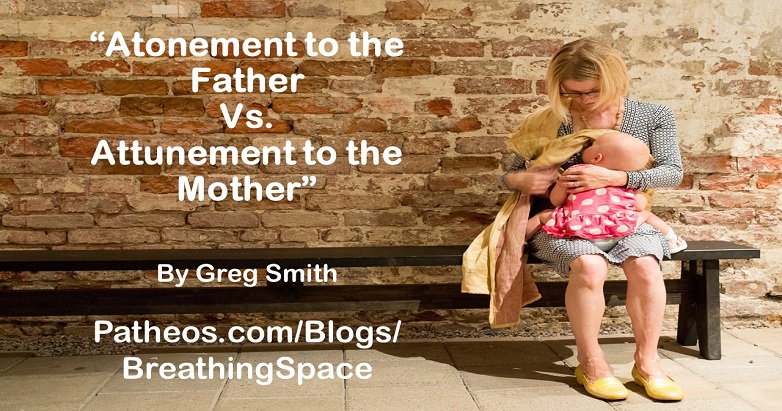Is it atonement to God the Father, or attunement to God the Mother that brings you peace?

The Christian church has inherited a narrative that goes something like this: Because of Adam and Eve, you were born with the stain of original sin inside you. Your sin offends God the Father, and only the blood of a perfect sacrifice can remove that stain. Throughout the centuries, people tried to appease the wrath of God by offering animal sacrifices. This worked for a while, but in the end, the blood of sheep and goats and bulls proved insufficient to stay God’s anger. Finally, because humanity could not atone for its own sins, God came in the flesh to become the ultimate human sacrifice. If you receive that sacrifice to be on your behalf, and you believe that Jesus is the only begotten son of God who died for your sins and rose from the dead, then and only then are you cleansed of those sins. You get to live eternally with your heavenly Father who threatened to burn you in hell. Once you were far away from this God in your sin. But because God sacrificed himself to himself, you can now be at one with the same abusive Father that set up such a violent system.
Something Wrong with This Picture
If you feel there’s something wrong with this picture, you’re not alone. The theory of penal substitutionary atonement lacks an understanding of a divine Father’s love. It offers a view of God as some monstrous being who set up a system where we’re born in sin, which God hates. Yes—God hates you just for being born and wants vengeance on you for it. In this view, the good news is that the Father is so blind in his rage that he is satisfied even if he takes out his anger upon the wrong person. So, God’s own Son steps in as a substitute to bear our punishment for being born. And God is pleased to torture his son to death on the cross. Who wouldn’t want to be at one with that kind of God?
Instead of the false doctrine of original sin, let me suggest an alternative. Understanding that God supersedes gender, we are free to refer to God as Mother as well as Father. Because God has been so often painted as an abusive male, it’s helpful to look at the motherly images of God in the Bible.
Motherly Images of God in the Bible
The following are a handful of scriptures in which God is described in maternal imagery:
- Jesus says in Matthew 23:37 NIV, “Jerusalem, Jerusalem, you who kill the prophets and stone those sent to you, how often I have longed to gather your children together, as a hen gathers her chicks under her wings, and you were not willing.” Jesus compares himself with a Mother hen, and we are the brood.
- In Isaiah 49:14 NIV, God says, “But Zion said, “The Lord has forsaken me, the Lord has forgotten me.” Then God gives the answer, “Can a mother forget the baby at her breast and have no compassion on the child she has borne? Though she may forget, I will not forget you!” It seems God has no problem using maternal imagery to describe divine love.
- Again, in Isaiah 42:14 NIV, God says, “For a long time I have kept silent, I have been quiet and held myself back. But now, like a woman in childbirth, I cry out, I gasp and pant.”
- In Hosea 13:8, God describes herself as a mother bear robbed of her cubs, violently protective.
- In Isaiah 66:13 NIV, God says, “As a mother comforts her child, so will I comfort you; and you will be comforted over Jerusalem.”
Since God is comfortable with maternal imagery, let me suggest another view of at-one-ment with God that is based on attunement versus atonement.
Instead of Atonement—Attunement
When a baby is inside the womb, it can perfectly hear its mother’s heartbeat and voice. The trauma of birth involves a separation from that complete oneness and utter connection to the infant’s source. The rhythm of her heart and the sound of her voice make up a music from which the child becomes detached at birth. The baby’s cries are a vain attempt to attune itself again to its mother.
When the infant cries because he feels separate from his mother, nobody says the child is sinful. Instead, the mother lifts her infant to her breast, nourishes him with her milk, and calms him with her song. Zephaniah 3:17 says that God rejoices over us with singing. When God does this, the child settles from crying to cooing, once again attuned to his mother. If God is the Mother, then Jesus is the song that stills our soul. Instead of atonement to an angry God, we need attunement to a divine Mother who loves us.
Proponents of penal substitutionary atonement want you to believe that God the Father is angry at your sin, offended by the circumstance of your birth as a child of Adam and Eve. They want to convince you then it’s a sin just to be human. And the only way to get God to forgive you for being born as a human is through blood atonement. This view of God as an abusive Father only scars the souls of people who already feel desperate and distant. Instead of atonement, we need to understand attunement. Because it’s only by listening to God’s heartbeat and becoming one with the divine song that we can be at one with God.













